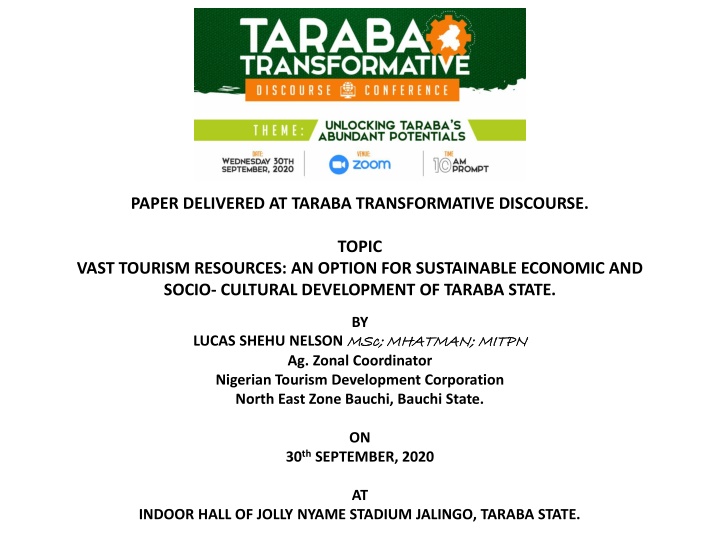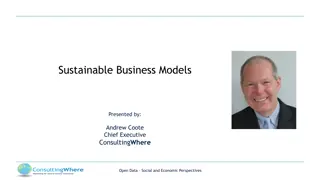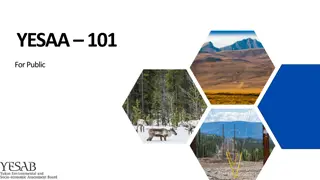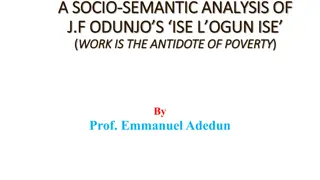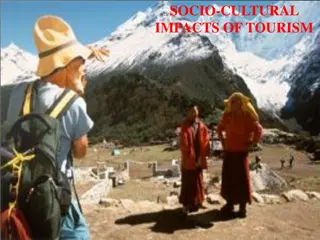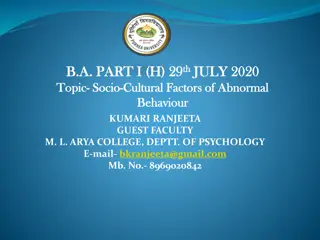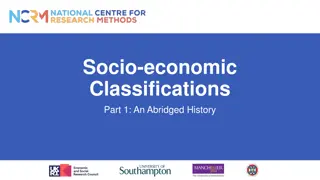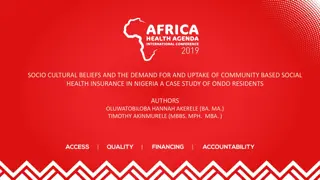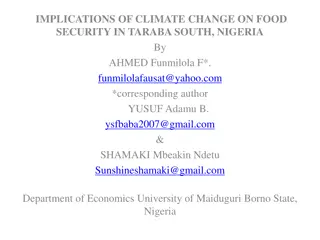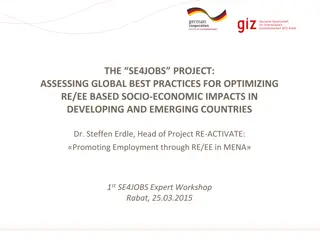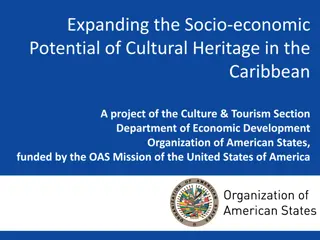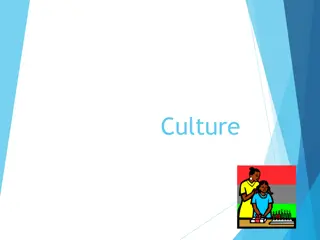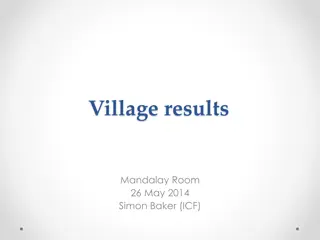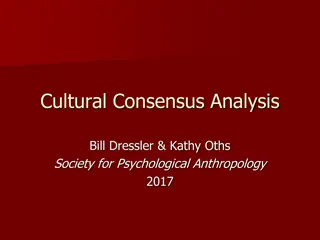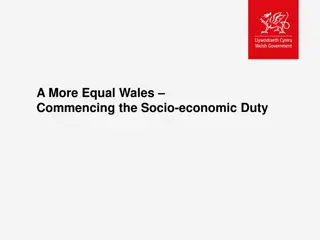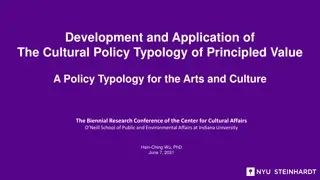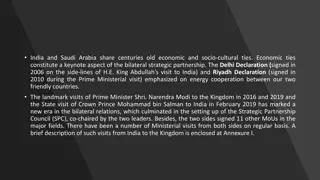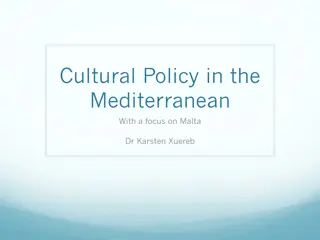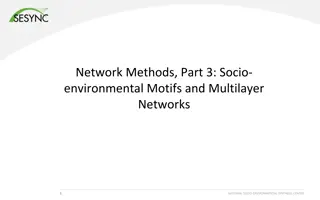SOCIO- CULTURAL DEVELOPMENT OF TARABA STATE.
Tourism, a complex and significant human activity, holds potential for economic and socio-cultural development in Taraba State. The paper delves into the importance of tourism, sustainable development principles, and harnessing opportunities in the tourism sector for growth. Emphasizing the need to leverage the abundant tourism resources in Taraba State, the discourse explores strategies for achieving sustainable development while preserving resources for future generations.
Download Presentation

Please find below an Image/Link to download the presentation.
The content on the website is provided AS IS for your information and personal use only. It may not be sold, licensed, or shared on other websites without obtaining consent from the author.If you encounter any issues during the download, it is possible that the publisher has removed the file from their server.
You are allowed to download the files provided on this website for personal or commercial use, subject to the condition that they are used lawfully. All files are the property of their respective owners.
The content on the website is provided AS IS for your information and personal use only. It may not be sold, licensed, or shared on other websites without obtaining consent from the author.
E N D
Presentation Transcript
PAPER DELIVERED AT TARABA TRANSFORMATIVE DISCOURSE. TOPIC VAST TOURISM RESOURCES: AN OPTION FOR SUSTAINABLE ECONOMIC AND SOCIO- CULTURAL DEVELOPMENT OF TARABA STATE. BY MSc; MHATMAN; MITPN Ag. Zonal Coordinator Nigerian Tourism Development Corporation North East Zone Bauchi, Bauchi State. LUCAS SHEHU NELSON MSc; MHATMAN; MITPN ON 30thSEPTEMBER, 2020 AT INDOOR HALL OF JOLLY NYAME STADIUM JALINGO, TARABA STATE.
PROTOCOL/WELCOME The Chairman, distinguished guests , ladies and gentlemen. I count it a great privilege and honour done me to share with you my little knowledge on the subject of tourism for the growth and development of Taraba State. May I welcome all of you and thank you for availing yourselves, that suggests to me your unparalleled enthusiasm and commitment to the growth of Taraba State.
APPRECIATION I wish to appreciate the organizers of this laudable conference that is powered by SERAPTA. As your name is, you will never be stranded in your pursuit for the betterment of our beloved State, Taraba. Particularly I want to thank the convener Mr. Godfrey Tafida for accepting me to speak to this no mean conference. My profound gratitude also goes to my Younger brother and good friend Dr. Etemi Garba for his recommendation. When the very first call came in, requesting that I speak in this conference, I received the request with mixed feelings first, could it be yet another moment of talking the talk? And secondly, I saw it as a rare privileged of adding my voice to the developmental strides of our dear State, Taraba. The theme of this conference has been of great interest to me particularly, for the reason of Taraba in the midst of abundance but yet in misery. So much is required to be seen done, if the desired result is to be achieved. Distintinguished guests, ladies and gentlemen I crave your indulgence as we get engaged in this presentation;
INTRODUCTION. Tourism is a highly complex phenomenon and an important human activity of great significance. It encompasses economic, social, cultural, environmental, educational and political significance. The complex nature of the tourism phenomenon also implies that various academic disciplines are involved in its study. Techniques such as planning, marketing research, statistics, sales support and publicity are also involved and are used extensively by tourism enterprises and subjected to their rigours (A. K Batia,2006). The concept of development is very broad; it covers economic, scientific, technological, socio-cultural, psychological and political aspects of human endeavour (Eneji et al., 2016). Sustainable Development is a holistic concept based on a simple principle. It refers to development and consumption in a sustainable way, such that our resources are not depleted and there is nothing left for future generations. However, sustainable socio-economic development is that development that hinges around social and economic indices of human endeavour without compromising same.
INTRODUCTION (CONTD) The quest for development in the contemporary world has taken the dimension of harnessing the abundant opportunities in the tourism sector. The United Nations World Tourism Organization (UNWTO) asserts that, the tourism sector represents an estimated 10.4% of the world s GDP, which is aboutUS$8.8trillion and 1 in 10 jobs worldwide. It is projected that tourism will continue to grow at an average of 3% annually until 2030. The African hospitality report 2019- 3rdedition prepared by JUMIA reported that; Regionally, travel and tourism remains one of the key growth drivers of Africa s economy, contributing 8.5% (or $194.2bn) of the GDP in 2018, up from 8.1% and 7.8% in 2017 and 2016 respectively . This growth record placed Africa as the second fastest growing tourism region in the world, with a growth rate of 5.6% in 2018 after Asia pacific and against a 3.9% global growth rate. Domestically, the Nigerian Bureau of statistics has stated that tourism accounted for 20% of employment in 2017 and contributed 34% to Nigeria s GDP in the same year. According to Babalola as cited in Dakogol and Alamai (2018), governments are concerned with identifying tourism opportunities that will add value to development. It does not only end with identifying tourists opportunities, but they must be harnessed, developed and used for income generation and thereby alleviating poverty. Similarly, Thomas as cited in Dakogol and Alamai (2018) states that most economies of the world have shifted their attention towards tourism as a sub-sector that has the potential to really set the pace for development. The above facts underscore the economic importance of tourism and as such set the stage for the discourse.
TOURISM DEFINED AND COMPONENTS The tourism industry is one of the largest industries in the world (United Nations World Tourism Organization (UNWTO, 2011). Tourism is travel for recreation, leisure, or business purposes. The United Nations World Tourism Organization (UNWTO) defines Tourism as the experience derived from the activities of persons travelling to and staying in places outside their usual environment for not more than one consecutive year and less than twenty four hours (24hrs) for leisure, business, and other purposes not related to the exercise of an activity remunerated from within the places visited . Tourism is a multi-faceted subject and so comprises of three major components of; Transportation modes, linkages, infrastructures, etc Hospitality/Amenities aggregates of all that is required to make a tourist comfortable at a destination. Attractions The reason for travel, what motivates travel: pull or push factors Physical motivators; Interpersonal motivators; and Status and Prestige motivators TOURISM Transportation Hospitality/Amenities Attractions
TYPES OF TOURISM Tourism is multi-faceted as stated earlier. As people or tourists are pushed or pulled to attractions for so many reasons, these reasons therefore define or determine the type of tourism they embark upon. It is on this backdrop that I wish to mention few of the types of tourism thus; Religious Tourism Adventure or Risk Tourism Cultural or Historic or Heritage Tourism Ecotourism Medical Tourism Agri-Tourism Business Tourism Sport Tourism Food Tourism (Gastronomy) Halal Tourism Rural tourism Urban Tourism Dark Tourism ETC.. It is also important to note that tourism can be either Domestic or international, whereas international tourism is either inbound or outbound
TOURISM DEVELOPMENT The tourism industry is an important sector of economic growth that is capable of stimulating opportunities for local residents to make profit especially those in the hospitality industry and other related tourism enterprises. In Nigeria, tourism is widely acknowledged as an effective tool for socio-economic development, because of the possible backward and forward linkages with the rest sectors of the economy, which allows it to facilitate employment opportunities, income, local economic development, and enhance the quality of life (Hall, 2007). However, Hall (2007) argues that the extent to which these benefits accrue to a nation crucially depends on local conditions. Furthermore, Manwa (2012) argues that for tourism to enhance sustainable development, the community has to benefit directly from it. This will enable them to protect and conserve the resources upon which it is based. This is further emphasized by Smith (2007) that apart from the type of tourism, the extent to which tourism confers economic benefits on any country also depends on the expectations of the tourists and the host country s ability to provide appropriate and adequate facilities and unless economic policies to promote tourism remain a focus in developing countries, tourism will not be a potential source of economic growth (Ekanayake and Long, 2012).
TOURISM DEVELOPMENT (CONTD) In Nigeria, lack of infrastructures is most pronounced in the rural areas where incidentally most of its tourists sites are also located. Nevertheless, efforts at developing infrastructure to support tourism in Nigeria, paltry as these may be, happen only in the urban areas (Briedenhann and Wickens, 2004). This is where and how tourism is expected to have its most impact on economic development given the infrastructure and income it can attract to rural Nigeria to spur economic growth (Fayissa et al., 2007). In this regard, tourism can facilitate the replication of infrastructure to the regions and the rural areas of Nigeria, which are usually the areas which lack amenities (Hawkins and Mann, 2007; SEPO, 2006). Sustainability is not only about being self-sustaining but also about being sensitive to local community needs and concerns, recognizing the importance of all the people in the decision making process (Ozgen, 2003).
Table 1: Some Tourism Resources in Taraba State. Attraction Mambilla Plateau Gashaka Gumti National park Kashimbila Game reserve Barup Waterfalls Tunga Dam Fikyu Rock Formation Kpambo Rock Formation Marmara Crocodile Pond Chappal Wadi Nwunyo Fishing and Cultural Festival Mount Jalingo Colonial Masters Cemetry Zing Rock Formations Bitako Rock Formations Donga River Basin Forest Wurkun Massif Ngel Nyaki Forest Reserve Akwa Salt Village River Benue Cultural Dances and Festivals Description Natural Natural Natural Natural Natural Natural Natural Natural/Cultural Natural Cultural Natural Man-made Natural Natural Natural Natural Natural Cultural/man-made Natural Cultural Location Sardauna Gashaka Takum Ussa Ussa Wukari Sardauna Ibbi Jalingo Ibbi Zing Zing Donga Karim Lamido Wukari Lau/Ibbi All LGA s
TOURISM DEVELOPMENTAL STRATEGY. Planning and Control Product research and planning for tourism plant or facilities Overall planning and coordination of administration concerning tourism Legislation Manpower planning and training Licensing and supervision of sectors of tourism industry Provision of Subsidies to tourism industry. Marketing and Promotion Undertaking market research and forecasting studies Content Development, Production and distribution of tourists publicity materials Opening and Operating tourist information centres Advertising, Sales promotion and Public Relation at home and outside. Financial Advising industry of Capital Development Recommending Financial Loans to Private Sector for various tourism related projects. Directing, Approving and Controlling Programmes of Government Assistance for tourism projects.
TOURISM DEVELOPMENTAL STRATEGY (CONTD) Public Relations Liaison, Co-operation (Economic and Technical) with other States, Countries and International Organizations. Research concerning tourism Policies in other climes Proposing Joint Ventures Assistance in Manpower Development and Training Co-ordination Co-ordinating in Planning the provision of tourists amenities and attractions Linking with trade and professional Bodies, Government (Regional or Local) Undertaking Coordinated Marketing activities with Private tourism bodies Participating in Travel trade fairs and Exhibitions and Organising Workshops/Seminars for buyers and sellers Liaison with various departments concerned with tourism indirectly.
EXPECTED ECONOMIC AND SOCIO CULTURAL BENEFITS OF TOURISM TO TARABA STATE Socio - Cultural benefits In many destinations, the creative industries or the cultural industries have also been identified as having important relationship with tourism and its benefits cannot be overemphasized. People travel to destinations that are associated with famous people, ideas and events and they want to experience the sights, sounds, history/heritage, gastronomy, architecture, handicrafts, etc. Socio-Cultural benefits of tourism can be highlighted thus; Cultural Understanding: As different people travel across boundaries, be it national or international, suffice to say that language, culture, traditions, norms, values, technology, etc also criss - cross these borders just as the people that carry these attributes or characters. By so doing host communities are impacted by these characters inherent in the tourists/visitors and the visitors alike are impacted by the members of the host community s characters and other virtues. Languages are learned, friendship develop that can culminate into marriages, business partnerships, etc and as such gaps that hitherto existed are closed up. Cultural fusion is reached and people begin to understand themselves better thereby eliminating strife, hatred, rancour and their likes.
EXPECTED ECONOMIC AND SOCIO CULTURAL BENEFITS OF TOURISM TO TARABA STATE (CONT D) Cooperation: Tourism has created good platform for cooperation amongst nations, regions, states and individuals. Treaties and peace accords are reached on deliberate tourism policies. For Example, in the area of visa issuance, national carrier routes, etc,. Other Developmental Benefits: The level of investment in tourism can determine the success of an area. The investment can be private or public. Often, there is an unwillingness to invest until there is a flow of tourists to a particular destination, but the tourists will not come to any region until there are facilities in the region that will cater for their needs. However, other industries and facilities will be attracted as a result of the tourists inflow. These developmental benefits can be in the area of Infrastructure development (road provision, power supply, water supply, communication facilities, etc), super structural development (buildings, interchange, Bridges, etc) and rural development (preservation of nature, landuse planning)
EXPECTED ECONOMIC AND SOCIO CULTURAL BENEFITS OF TOURISM TO TARABA STATE (CONT D) Economic Benefits The most obvious implication of sustainable practices within a business is the financial character (Eggerling, 2010). The economic effects of visitors presence at a destination arise from the fact that travellers spend their monies on a variety of goods and services. This expenditure can be seen as injection of financial resources into the host community s economy thereby creating new levels of finance thus; Generation of foreign exchange: international tourists generate foreign exchange earnings. As tourists visit different countries the need to spend local currency of host country (destination) will necessitate the exchange of foreign currency into local currency. This enhances the economy of the host destination especially where foreign currency is in high demand. As a result, the host community has more foreign currency to spend on its needs such as, providing better medical and educational facilities or stimulating general economic growth. Income: Salaries, interest, rent and profits all contribute to income generation. In the tourism industry which is labour intensive, the greatest proportion of income will be derived from salaries paid to the workers both directly in serving the tourists or to those benefitting indirectly from tourists spending. Tourism is the main income generator for one third of the developing countries(S, Page and J, Connell, 2008)
EXPECTED ECONOMIC AND SOCIO CULTURAL BENEFITS OF TOURISM TO TARABA STATE (CONT D) Taxation: This also contributes to a destination income. For example the value added tax (VAT) on all rooms occupied by guest at 7.5% are added to the room rates and charged on guests. Levies: Just like taxes, various states in Nigeria enact laws through their respective parliaments to charge tourism levies at various percentages on the utilization of tourism services. This is paid into the government s treasury for the purposes of tourism development and other developmental needs. Balance of Payment: International tourists contribute to a country s balance of payment through money spent as credited into their balance of payment of the tourism account. Job Creation/Employment: Tourism is a labour intensive industry therefore it is a high employer of labour. Its labour characteristics gives room for many semi-skilled persons to be engaged and also its flexibility allows for shift therefore people can pick more than one job at a time. For example, a home maker (housewife) can at the same time be a weaver or a craft artist who sells her materials and crafts as souvenir to tourists.
OPPORTUNITIES IN THE TOURISM INDUSTRY HTE s owners Managers of HTE s Stewards Bartenders Arts and Crafts Souvenirs Tour Operators Curators Travel Agents Event Planners/ Managers Tour Guides Air hosts/Attenders Resort Developers Architects, Planners, etc. E Tourism/ Hospitality ICT Car hire Services/ Transport operators Tourism Marketers Food vendors / Bukaterias ETC.
HINDRANCES TO TOURISM DEVELOPMENT IN TARABA STATE It is pertinent to state that, factors hindering tourism development in Taraba State include; Poor governance and inappropriate conflicting policies Poor funding Unreliable data base i.e. poor data base Improper valuation of tourism resources Inadequate infrastructure Unfriendly business environment Man power capacity Poor promotion strategies Insecurity institutional capacity, inappropriate technologies and non-application of contemporary technologies Lack of tourism policy/master plan. Negative perception on tourism.
RECOMMENDATIONS To complement the tourism resources as endowed in Taraba State and in line with the highlighted challenges, it is important that I make the following recommendations; A high profiled committee be set up , comprising of relevant professionals in the field of tourism both in the public and private sector to come up with a robust Taraba State Tourism Master Plan. Deliberate Tourism Policy should be put in place to emphasize on; Public, private partnership. Tourism sites and services schemes. Tax Holiday Adequate and Prompt funding of tourism Concessionary rates should be considered on tourism lands. Capacity building/ Training Community/Public Participation Tourism Police/Security Effective tourism research and statistical data gathering Development of critical tourism infrastructure and amenities Effective marketing and promotion strategies.
CONCLUSION To say that Taraba State is naturally endowed with tourism resources is to say the least. But to also say that Taraba is the nature s gift to the nation and living by it is but, making a statement of self-deceit. However, the desired narrative can be achieved through deliberate and conscious effort of all and sundry. I wish to call on all meaningful stakeholders in the wheel of progress of the state to as a matter of responsibility and bearing in mind the place of posterity to do everything possible to change the current tide and rewrite their names in gold.
THANK YOU Distinguished guests, ladies and gentlemen thank you for listening.
REFERENCES Ajadi, B. S. (2012): An Evaluation of the Performance of a National Tourism Organization: Nigeria Tourism Development Corporation. European Journal of Business and Social Sciences, 1, 40-48. Batia, A. K. (2006): International Tourism Management. Sterling Publishers Pvt Ltd, New Delhi. Bello, Y.O., Udi, I., Bello, M.B and Raja, N.Y. (2016): Introduction to Hospitality Management. Grace Excellent Publishers, Ondo. Briedenhann, J., &Wickens, E. (2004): Tourism Routes as a Tool for The Economic Development Of Rural Areas-Vibrant Hope Or Impossible Dream? Tourism Management, 25, 71-79. Dakogol, C. and Alamai, M. M. (2019): An Examination of Tourism potentials for Rural development in Barikin Ladi Local Government Area of Plateau State, Nigeria. In Journal of Tourism, Hospitality and Applied Sciences Vol.I, Issue I, Pp 1-8. Dantata, M. (2011): Tourism Development in Nigeria: Challenges and Prospects for Resource Diversification. Available from http://www.nihotour.org/Dantata.munzali@ yahoo.com Accessed on 17/03/2020
REFERENCES (CONTD) Eggeling J. (2010): Sustainable Tourism Practices in the Hospitality Sector: A study of Scandic. Bachelor thesis in the Department of Social Sciences (Business Adminisration C) Mittuniversitetet Mid Sweden University Ekanayake, E. M., &Lonng, A. E. (2012): Tourism Development and Economic Growth in Developing Countries. International Journal of Business and Finance Research, 6(1), 61-63. Eneji M. A., Odey F. A. and Bullus M. L. (2016): Diversification of Nigeria s Economy; Impact of Tourism on Sustainable Development in Nigeria. International Journal of Research in Humanities and Social Studies Volume 3, Issue 5, May 2016, PP 36-44 ISSN 2394-6296 Fayissa, B., Nsiah, C., &Tadasse, B. (2008): The Impact of Tourism on Economic Growth and Development In Africa. Tourism Economics, 14, 807-8188. Godfrey, K., & Clarke, J. (2000).Tourism Development Handbook: A Practical Approach to Planning and Marketing: Thomson Learning Emea. Hall, C. M. (2007): Pro-poor Tourism: Who Benefits: Perspectives on Tourism and Poverty Reduction. Channel View Publications. Ijeomah, H.M. and I.A. Ayodele.(2011): Contributions of ecotourism destination towards poverty alleviation in Plateau State, Nigeria. Asia Pacific Journal of Rural Development, Vol. XXI Pp 45-55 (Bangladesh).
REFERENCES (CONTD) Lucas, S. N. (2018): The Fundamentals of Tourism Principles and Practice in Nigeria. PalmGate Publishers, Bauchi. Manwa. (2012): Communities Understanding of Tourists and the Tourism Industry: the Lisotho Highlands Water Project. African Journal of Business Management, 6(2), 6667-6674. Ozgen, S. (2003): Designing for Sustainable Tourism Developments Case Studies of Greek Islands. Paper presented at the 5th European Academy of Design Conference, Design Wisdom, Barcelona, 28-30 April 2003. SEPO. (2006): Policy Insight: Tourism as a Development Strategy: Senate Economic Planning Office of The Philippines. Stephen, P. and Joanne, C. (ed) 2008: Sustainable Tourism. Routledge, London and New York. Stephen, W. (2009): Tourism Geography- A new synthesis. Routledge, London and New York. Tunde, A. M. (2012): Harnessing Tourism Potentials for Sustainable Development: a Case of Owu Waterfalls in Nigeria. Sustainable Development in Africa, 14(1), 119-133. United Nations World Tourism Organisation (2015): Tourism and the Sustainable Development Goals UNWTO. (2010): Tourism Highlights 2010 Edition. Madrid: World Tourism Organization Vaugeois, N. (2000): Tourism in Developing Countries: Refining a Useful Tool For Economic Development. Paper presented at the 6th World Leisure Congress, Bilbao, Spain. WTTC (2014, 2015): World Travel and Tourism Council, 2014 and 2015. The Authority on World Travel and Tourism: Travel and Tourism Economic Impact on Nigeria.
